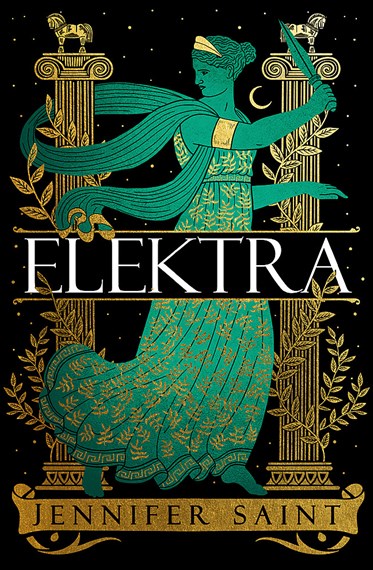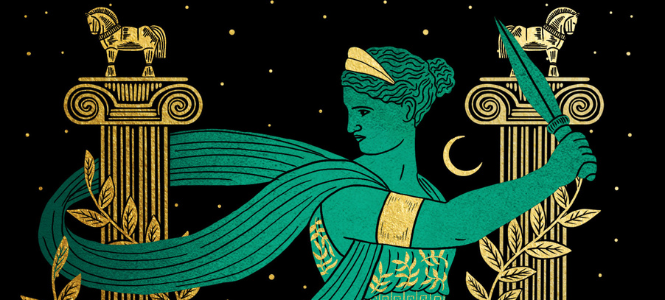Due to a lifelong fascination with Ancient Greek mythology, Jennifer Saint read Classical Studies at King’s College, London. She spent the next thirteen years as an English teacher, sharing a love of literature and creative writing with her students. Ariadne is her first novel and Elektra is her second.
Today, Jennifer Saint is here to take on our Ten Terrifying Questions! Read on …
1. To begin with, why don’t you tell us a little bit about yourself – where were you born? Raised? Schooled?
I was born and raised in Leeds, a Yorkshire city in the north of England. My big passion was mythology and the ancient world but none of the schools I went to offered it as a subject. When I was halfway through sixth-form college aged seventeen and found out another college offered a course in Classical Civilisation, I dropped out and got a job for the rest of the year until I could enrol there instead and I never looked back!
2. What did you want to be when you were twelve, eighteen and thirty? And why?
By age twelve I knew I wanted to be an author and I read books and wrote short stories voraciously. I still did at eighteen, though I also thought travel journalism would be a great career and I had a piece published while I was backpacking in Australia that I hoped would be the start of something (it wasn’t!). At thirty I was an English teacher but still hadn’t let go of the conviction that writing was the career for me, though I didn’t know at the time how I was going to get there. It was another six years before I took the plunge and wrote Ariadne.
3. What strongly held belief did you have at eighteen that you don’t have now?
That enthusiasm for anything was desperately uncool and presenting myself as a cynic was much better. (Also that dresses over jeans looked good – it was the early 2000s!)
4. What are three works of art – this could be a book, painting, piece of music, film, etc – that influenced your development as a writer?
I read Roger Lancelyn-Green’s children’s novel A Tale of Troy when I was about eight years old and it ignited a real fascination with the myths of the Trojan War, particularly as I remember it portrayed the story from Helen’s point of view and made her a very sympathetic character. I was so taken with the idea of telling the story of the ‘villain’ that I wrote a version of Sleeping Beauty from the point of view of the bad fairy. I made it into a book and drew the cover and took it into school where everyone told me it was ‘very long’ – I guess I hadn’t realised the importance of editing by then!
I’ll never forget watching Baz Luhrmann’s Romeo + Juliet aged fourteen. To see a story I knew so well wrought in vivid colour, Shakespeare’s words, suddenly relevant and relatable to my teenaged self, and the inevitable tragic ending which somehow managed to come as a shock were an absolute revelation to me. I wanted to be able to retell a story like that, one that would feel so fresh and different and that would reveal so many more layers to something people think they already know everything about.
At nineteen, I went to King’s College, London for my degree and studied a module on classically inspired paintings, visiting the National Gallery to see some of them in real life. It was the first time I realised the myriad forms of classical reception and the ways that so many different kinds of artists had taken ancient myths and transformed and enriched them through their own interpretation. I wrote an essay on Caravaggio’s Narcissus, absolutely blown away by how bold and striking and powerful it was and how much life it gave to the mythical character I’d always thought of as quite silly – he’s so enamoured of his own appearance that he falls into a pond and drowns gazing at his reflection in the water! – but something about the way that Caravaggio painted him translated his yearning into something moving and powerful. I think it made me realise how artists can breathe real life into these ancient constructs and remake them into something new.
5. Considering the many artistic forms out there, what appeals to you about writing a novel?
Probably the fact that I love reading so much and novels have given me a wealth of entertainment, enjoyment and comfort in my life, making me think more deeply and giving me the opportunity to see the world differently. Even with so many different types of media competing for our attention, I don’t think there are any as satisfying as losing myself in a good book.
‘I love it when readers tell me that after reading my novel, it sparked a deeper interest in Greek mythology and that they went on to read more.’
6. Please tell us about your latest book!
Elektra tells the story of three women who, while the Trojan War rages in the background, are fighting their own battles. Clytemnestra, the wife of the Greek king Agamemnon, is consumed by rage for her absent husband and her burning desire to take revenge on him for the crime he committed before he left. Meanwhile in Troy, the priestess Cassandra is cursed by Apollo to be able to see the future but never be believed. She knows that her city will be destroyed by the Greek forces, but has to battle alone to try to save it. Back in Mycenae, Elektra, the daughter of Clytemnestra and Agamamnon, grows up scarred by loss and desperate for a time before war. Blind to her father’s true nature, she nurtures a dangerous and deluded obsession with him which grows to threaten everyone around her.
7. What do you hope people take away with them after reading your work?
I love it when readers tell me that after reading my novel, it sparked a deeper interest in Greek mythology and that they went on to read more. One book blogger in particular actually decided to study a degree in Classics after reading Ariadne and is now writing her own mythological retelling alongside it, and I’m so honoured to have played a part in planting the seeds for that!
8. Who do you most admire in the writing world and why?
I really admire Joanne Harris who has written so many wonderful novels and is also so helpful and supportive to writers on Twitter, offering generous advice and useful tips that I turn to frequently for inspiration and reassurance.
9. Many artists set themselves very ambitious goals. What are yours?
I prefer to set small and short-term goals. It’s always to finish the next thing – a first draft, a structural edit, maybe even just a tricky scene or awkward paragraph! Thinking bigger than that can be paralysing to me – I prefer to concentrate on what I’m doing right now and to make it as good as it can be.
10. Do you have any advice for aspiring writers?
What really worked for me was to overcome the embarrassment I felt in saying I was writing a novel – I felt like people would laugh at me because it was absurd to think I could ever be an author. But then I went to a literary event and realised that the biggest difference between me and the authors on stage was that they had written a book and I hadn’t. If I kept telling myself that I couldn’t do it, then I would never know if it was true or not. So I started writing and I started telling everyone I knew what I was doing. It made me accountable to others – when they asked how the novel was going, I didn’t want to say I’d given up. I kept on going and that’s all there is to it really – just keep on writing and keep believing in yourself.
Thank you for playing!
—Elektra by Jennifer Saint (Hachette Australia) is out now.

Elektra
The House of Atreus is cursed. A bloodline tainted by a generational cycle of violence and vengeance. This is the story of three women, their fates inextricably tied to this curse, and the fickle nature of men and gods.
Clytemnestra: The sister of Helen, wife of Agamemnon - her hopes of averting the curse are dashed when her sister is taken to Troy by the feckless Paris. Her husband raises a great army against them and determines to win...







 Booktopia’s top picks for series’ to binge
Booktopia’s top picks for series’ to binge  The best books we read in March 2021
The best books we read in March 2021
Comments
June 20, 2022 at 3:18 pm
I loved reading the remarks from the author. Especially when I realized that we both had something in common I also read the same book on Troy and a very young age. It was the first Christmas present I every asked from Santa I was only 7. It would go on to be a life long obsession with anything to do with the War in Troy